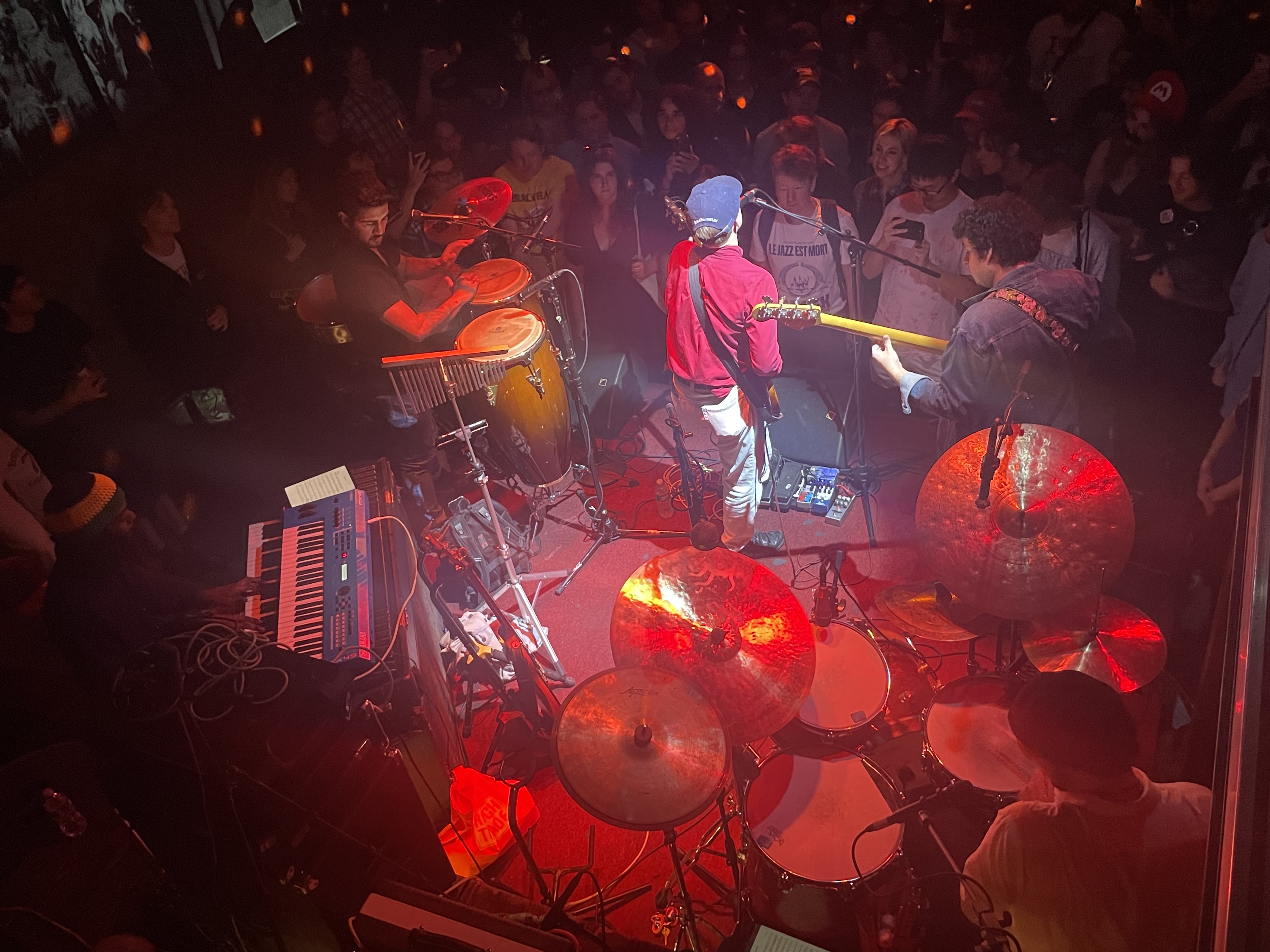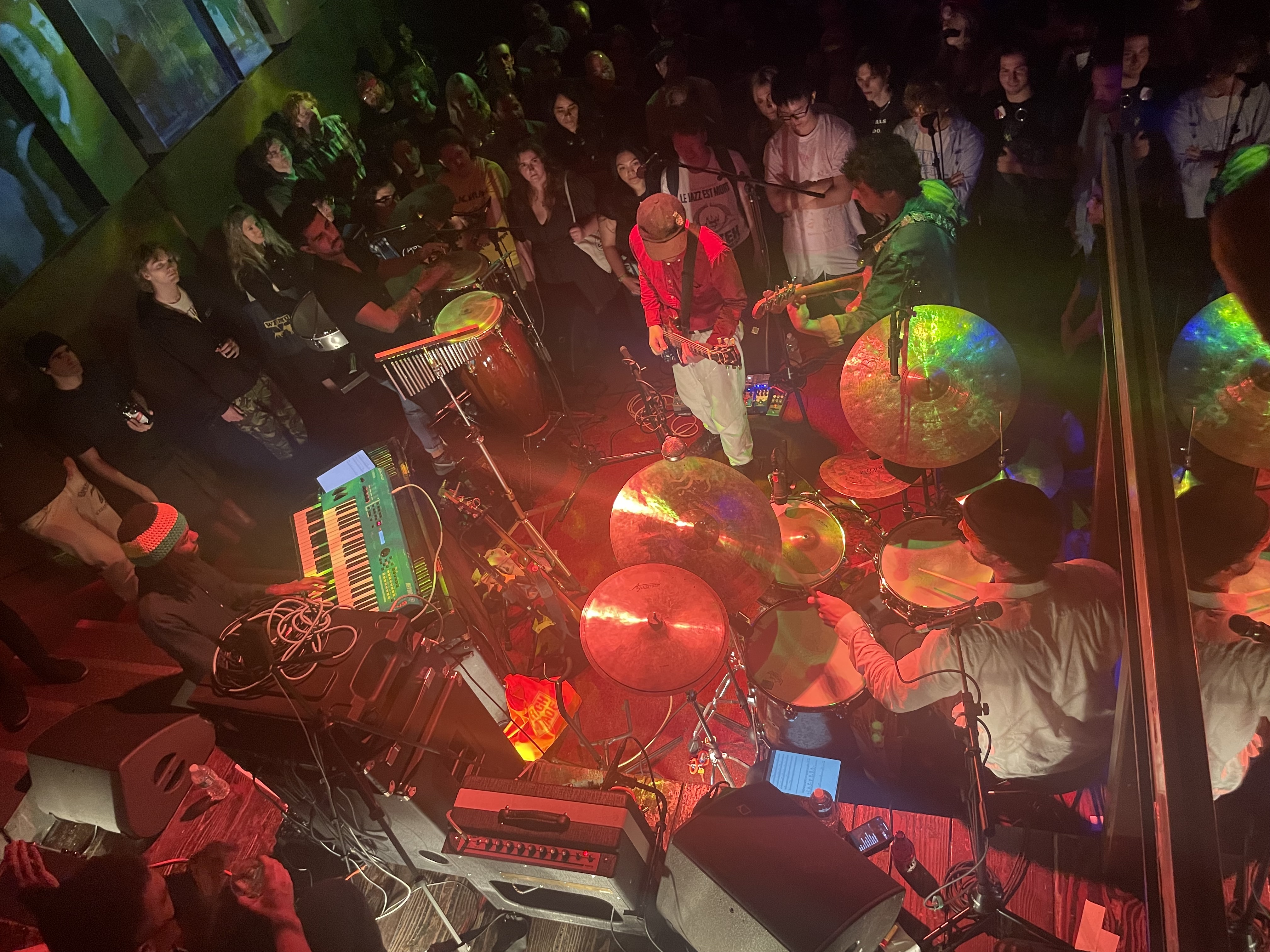
Geordie Greep performing at Nublu. All photos by Victoria Borlando.
Geordie Greep Escapes to the Americas to Find “The New Sound”
The musician explores the tiny space between dreams and reality where anything absurd could happen.
By Victoria Borlando
09.25.2024
On September 11, I walked into Nublu to satisfy an itch I had all summer. Geordie Greep, founding member of the London experimental rock band black midi, had recently broken up his band via Instagram Live, secretly recorded an album, and fled to New York City for three nights to play his debut record, The New Sound, live. I bought my ticket in July, having some idea that black midi was going to be dead soon, but I had absolutely no clue there was going to be a Greep record almost immediately after the announcement, let alone an entire manifesto of what he has dubbed “The New Sound.”
Geordie Greep marketed these three concerts as his “first time on U.S. soil” (despite visiting us before under black midi). By booking a gig at Nublu—a nightclub often attributed as the center of NYC indie nightlife since its founding in 2002, the peak of the American rock revival—he seems to be doing more than reinventing himself. In fact, after attending his concert, I’d say he’s become a different person entirely. He’s enamored by the Americas and the concept of starting over, looking to this hemisphere to escape from most memories of his previous artistic ventures.
Interest in his environment is nothing new to Geordie Greep’s writing and composition. black midi’s sound was, at its core, a reflection of London’s urban landscape: discordant instruments playing simultaneously; a fast-paced, speech-singing vocal style that mimics a news broadcaster; an improvisational jam style that fused together prog rock, post-punk, math rock, and avant-garde jazz. Greep’s former sound encapsulated the industrial, chaotic, and decadent nature of the smoggy metropolis.
But at this solo performance—despite the sweaty, cramped, and neon-lit setting of Nublu—his set felt like fresh air, reminiscent of a dizzying night of dancing in a South American club. While his lyrics are as crazy as they were before, the songs capture the free-spirited, outdoorsy, and joyful vibe he must’ve felt while writing and recording The New Sound in Brazil.
Listening to Greep’s The New Sound live is like watching a Paul Gauguin painting come to life. The collage of several percussion instruments, piles of keyboards, and necks of different guitars; the dizzying, perpetual spin of the disco ball and multicolored lights; uninterrupted streams of bossa nova-inspired rock music pouring out from the four members of the band—these 90 minutes felt like a feverous, hazy all-nighter at a resort in Rio. There’s a great beauty that emanates from the world Greep had composed for us. Nodding one’s head or tapping one’s fingers along to the steady beats of the bongos, the glides of the chimes, or even the hypnotic electric guitar riffs that inject an improvisational quality to the songs was irresistible. I found myself utterly transfixed during the set, only erupting into thunderous applause once Greep put his guitar down.
Then there are the unhinged lyrics that shatter the painting of a Brazilian bossa nova paradise. While it was sometimes difficult to parse out the words against the constant jamming from the band, and there were no announced song titles to help us keep track of the setlist, the occasional questionable phrase jumped out. It’s hard not to widen one’s eyes in shock after a sunny, sweet-looking, blonde British man sings with total conviction, “When I tell you your pussy is holy / I want you to slap me and then kiss me.” In fact, a lot of the songs on The New Sound are obsessed with prostitutes and women, with each exploration into the narrator’s psyche getting more graphic and violent as the set progressed.
At face value, Greep’s fascination with the Americas, particularly Brazil, could be read as problematic. Again, the comparison to Paul Gauguin, whose dazzling, fantastical paintings are tainted by his blatant objectifying and racist depictions of Tahitian women, isn’t too far-fetched. However, Greep’s freakiness isn’t that at all. The singer divorced himself from the over-confessional, vulgar male protagonist of The New Sound. Right before he jumped on the stage, he pulled his cap down to right above his eyes, never taking it off once during the set and concealing his features. He never introduced himself—just the other members of the band—and he rarely spoke in between songs. Greep effectively disappeared and let the music speak for itself; he put on the mask of the character that, during the final song, broke into a manic confession: “I’m hiding from you, I’m hiding from you, I’m hiding from you.” The set ended with a kick drum imitating a heartbeat fading out, signaling the death of this troubled character at his most vulnerable and the return to a calmer, friendlier reality. Once the set finished, I could see that Greep had crafted a nuanced character study of a deeply flawed young man struggling to suppress his escapist fantasies, distorted thoughts, disturbing fetishes, and feelings of social alienation.
I now know what “The New Sound” is: it’s the tiny space between dreams and reality where anything absurd could happen. It’s a celebration of the contours of music neatly packaged into eleven songs. Most importantly, it’s a testament to the creativity of Geordie Greep, who has shown that he has the potential to go even further with his career, perhaps finally making an imprint on U.S. indie tastes that black midi never quite achieved. The New Sound is a celebration of cultural exchange, and nothing symbolized that better than Greep’s performance at Nublu.

